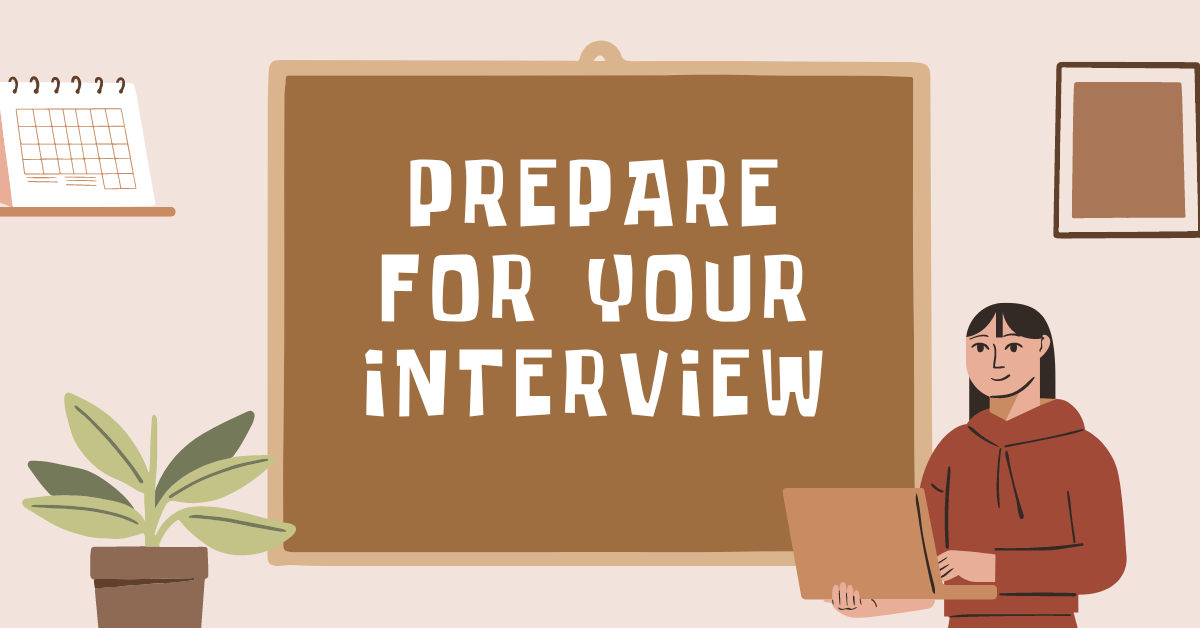Amazing! You’ve been invited to have an interview. You’ve probably already had to take a battery of psychometric tests through the hiring process up to this point and have got through them. So give yourself a pat of the back. However, the toughest task is yet to come. It may be just one interview with a manager. But it might be considerably more than that. And you must be prepared for each step of the journey. So let’s prepare you so you’ll know how to prepare for an interview in the best possible way. And hopefully, you’ll get that job offer you’ve been after!
Boost Your Interview Skills Now
Improve your interview skills in under 10 minutes!
Join thousands of successful job seekers!
- How to Prepare for an Interview – In One Paragraph!
- Research the Company
- Review the Job Description
- Practice Answering Questions
- Dress to Impress
- Don’t Be Late
- Bring Resume Copies
- Follow up Post-Interview
- Follow up Post-Interview
- Get Your Listening Skills up to Scratch
- Be Authentic
- Show Enthusiasm
- Practice Good Posture
- Find Out Who Is Going to Be Interviewing You
- Prepare for Behavioral Questions
- Showcase Achievements
- Conclusion
- FAQs
How to Prepare for an Interview – In One Paragraph!
The truth is that if you bear the following in mind you are already one step ahead of the field. But we want to more than just one step. We want more:
To prepare for an interview, research the company thoroughly. Tailor your answers to match the job description. Practice answering questions confidently using examples. Dress professionally and arrive early. Maintain good posture and highlight your achievements. Research the interviewer to build rapport. Prepare for behavioral questions too. These steps will help you make a strong impression. And that’s about it in a paragraph. However, that’s not really going to be enough so we’ll explore each of these and maybe some more so that you’ll really know what to do.
Research the Company
When preparing for an interview, start by researching the company’s mission, values, and culture to align your responses effectively. Understanding the company’s mission gives you insight into its overarching goals. Familiarizing yourself with its values helps you tailor your answers to resonate with what the organization holds dear.
Explore the company’s culture to confirm your approach aligns with their working environment.
If there is any recent news or developments within the company showcase your interest and dedication. This shows that you really care about the job you are after.
By researching the company thoroughly, including its products and services, community involvement, and background, you demonstrate a genuine commitment to understanding the organization you aspire to join.
This knowledge not only prepares you for the interview but also allows you to ask insightful questions that highlight your enthusiasm and alignment with the company’s values. Remember, the more you know about the company, the better equipped you are to highlight why you’re the ideal candidate for the role.

Review the Job Description
As you explore into the specifics of the job description, focus on understanding the key responsibilities and qualifications outlined to effectively align your skills and experiences during the interview.
Review the job description carefully to identify the essential skills and experiences required for the position. Tailor your answers during the interview to highlight how your background aligns perfectly with the job requirements.
Make sure to prepare specific responses that highlight relevant examples from your past experiences, emphasizing how they directly relate to the job description. By aligning with the job requirements and highlighting relevant examples from previous employers, you’ll demonstrate to the interviewer that you’re the ideal candidate for the role.
Practice Answering Questions
To enhance your interview skills, dedicate time to practicing answering interview questions effectively and confidently.
Start by familiarizing yourself with common interview questions and structuring your responses using the STAR method – Situation, Task, Action, Result.
It’s worthwhile checking out other forum sites where you are probably going to be able to find previous questions that were asked during interviews. Knowing what they are will help you increase your chances of success. You can prepare the answers and check out if they are really good or not.
Practice articulating specific examples from your previous experiences that highlight your skills and problem-solving abilities. Mock interviews are great for doing this and here at Skillful Talk, you can get all the practice you’ll ever need!
Focus on demonstrating how you have successfully resolved challenging situations in the past to highlight your capabilities to the interviewer.

Dress to Impress
Smart business attire really sets up a successful interview. Make sure you dress professionally in like a business suit or professional dress. Dressing appropriately shows importance for the interview process and the potential employer. Your clothes should be clean, well-fitted, and free of wrinkles to present a polished appearance.
But looking sharp isn’t just about your outfit. Your hair, nails, and accessories matter too.
Interviews tend to pick up on little things. Make sure that it’s not something that they could take offense to. Maybe you love that skull and crossbones ring. That’s fine. But if the interviewer doesn’t like it, it can put you in a worse position.
Avoid wearing strong perfumes or colognes that may distract or overpower during the interview. Your attire and grooming choices are vital aspects of your overall presentation, reflecting your readiness for the professional life you aspire to.
Boost Your Interview Skills Now
Improve your interview skills in under 10 minutes!
Join thousands of successful job seekers!
Don’t Be Late
Have you ever considered the impact of arriving early for an interview on your professionalism and the interviewer’s time? Being punctual is crucial to making a positive impression and showing your enthusiasm for the opportunity.
Arriving at least 10-15 minutes before the scheduled time demonstrates professionalism and respect for the interviewer’s schedule.
This simple act allows you to compose yourself, review important details, and mentally prepare, setting a confident tone for the interview.
Arriving early not only guarantees a smooth start to the interview process but also gives you the opportunity to make a strong first impression. It sets the stage for a successful interaction and highlights your dedication to the position.
Bring Resume Copies
Make sure to have at least 5 copies of your resume ready for the interview. Having extra resume copies shows that you’re prepared and enthusiastic for the opportunity. Print them on high-quality paper for a professional touch.
Keep your resume copies organized in a folder or portfolio that you can easily access during the interview. Tailor each copy to highlight relevant skills and experiences that align with the job you’re interviewing for.
Offering your resume copies at the beginning of the interview demonstrates your proactive approach.
Follow up Post-Interview

Follow up Post-Interview
Guarantee your communication remains professional and timely by sending a thank-you email within 24-48 hours of your interview.
Express gratitude for the opportunity and highlight key discussion points in your thank-you note.
This shows attention to detail and professionalism. Follow up on any outstanding questions or information from the first interview. This demonstrates your attention to detail and commitment. Hopefully you’ll be invited back for future interviews!
Sending a well-crafted thank-you note is a simple yet effective way to leave a positive impression on the interviewer and set yourself apart from other candidates.
Get Your Listening Skills up to Scratch
Listening attentively during an interview is crucial for understanding the questions asked and engaging in meaningful conversations. To guarantee you’re actively listening, remember to:
- Pay attention: Concentrate on the interviewer’s words, tone, and body language to grasp the full context of the conversation.
- Formulate thoughtful responses: By listening carefully, you can customize your answers to address specific points raised during the interview.
- Ask for clarification: If you’re unsure about a question or need more information, don’t hesitate to request clarification. It demonstrates your interest and attention to detail, improving the quality of your responses.
Engaging in active listening not only shows respect but also allows you to respond effectively and highlight your understanding of the topics discussed. By incorporating these listening skills, you can leave a positive impression on the interviewer and ensure a fruitful exchange of information during the interview.
Be Authentic
Embodying authenticity in job interviews allows you to display your genuine self. Not only this but it also builds a strong connection with the interviewer. Present yourself as you truly are, without exaggeration or falsehoods. This doesn’t mean saying any kinds of secrets. It just means ensuring that you show your absolute best self. Remember, this is a job interview. You aren’t trying to make a friend here. Hopefully this will come later. Being authentic in an interview is about your professional qualities, not about anything else.
By staying true to your unique qualities, experiences, and skills, you demonstrate integrity and build trust with the interviewer.
When you’re authentic, you showcase your true potential and increase your chances of making a lasting impression. Let your personality shine through! Remember, the interviewer isn’t just looking for qualifications; they want to see the real you. Authenticity helps you present yourself confidently and comfortably, creating a genuine interaction that can set you apart from other candidates.
Show Enthusiasm
Demonstrate authentic interest and excitement for the company and the position during the interview to highlight your enthusiasm. Your passion and enthusiasm can leave a lasting impression on the interviewers.
- Express Genuine Interest: Convey why you’re enthusiastic about the opportunity and what specifically attracts you to the company and the new job you hope to get.
- Highlight Your Passion: Share examples of how your love for the industry has influenced your career decisions.
- Use Positive Language: Infuse your responses with enthusiasm and a positive attitude to demonstrate your genuine interest in the role and the organization.
This isn’t the same as being authentic. You can be authentic and dour. But that’s not what we are aiming for here.

Practice Good Posture
Why is maintaining good posture and body language important during an interview?
Good posture is vital as it conveys confidence and professionalism, leaving a lasting impression on the interviewer. When you sit up straight with your shoulders back, you appear more attentive and engaged, highlighting respect and interest in the conversation. Avoid slouching or leaning back in your chair, as it can detract from your professional image.
It’s not just about making a good impression instead of a negative impression. By sitting up right and looking like you are being attentive, you can even trick your body into doing so.
Find Out Who Is Going to Be Interviewing You
Regularly researching the hiring manager’s professional background is essential for preparing effectively for your upcoming interview. You can often find out who is interviewing you. If the interviewer is someone from HR, it’s unlikely that they are going to ask you detailed questions about technical matters. However, if you progress to an interview with a manager, you will often need to give specific examples and possible answer questions about the job you are applying for.
The more you find out, the more likely you will be able to unearth both what questions you may be asked but also the type of person they are. Most people have some kind of social media presence. Take a look and you’ll often be surprised at what you may find that can help you craft your answers accordingly.
Prepare for Behavioral Questions
When preparing for your interview, focus on mastering how to effectively respond to behavioral questions that assess your past experiences and actions. To improve your interview technique, prepare for behavioral questions by providing specific examples from your past roles.
Practice answering interview questions using the STAR method (Situation, Task, Action, Result) to structure your responses coherently. When addressing behavioral questions, make sure to highlight your problem-solving skills, communication abilities, and leadership qualities.
Employers use these questions to evaluate how you handle challenges and demonstrate essential skills, so showcasing your abilities through real-life scenarios is vital. By offering concrete examples of how you navigated difficult situations in the past, you can effectively exhibit your competencies, convey confidence, and show your suitability for the role.

Showcase Achievements
How can you effectively highlight your achievements during an interview?
To prepare thoughtful responses, focus on quantifying your achievements using numbers or percentages to demonstrate impact.
Articulate your skills by displaying accomplishments that directly relate to the job you’re interviewing for.
Use the PAR method (Problem, Action, Result) to explain how you tackled challenges and achieved success.
Tailor your achievements to align with the company’s goals and values, emphasizing the skills and abilities that are most relevant to the position.
When discussing your accomplishments, be specific and provide concrete examples of how you have excelled in previous roles.
Conclusion
Interviewing can be nerve-wracking, but with the right preparation, you can walk in feeling confident and ready to impress. Remember, the interview is just as much about the company evaluating you as it is you evaluating them.
Stay focused on highlighting your authentic self – your skills, experiences, and personality traits that make you uniquely qualified. Don’t be afraid to ask insightful questions that demonstrate your enthusiasm for the role and the organization.
At the end of the day, proper preparation is key. By researching the company inside and out, practicing your responses, and polishing your professional presence, you’ll be prepared to sell yourself as the ideal candidate.
Trust the process, take a deep breath, and let your hard work speak for itself. You’ve got this! With dedication and the right mindset, you’re well on your way to landing your dream job.
Boost Your Interview Skills Now
Improve your interview skills in under 10 minutes!
Join thousands of successful job seekers!



